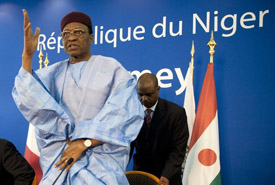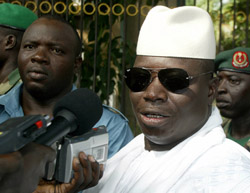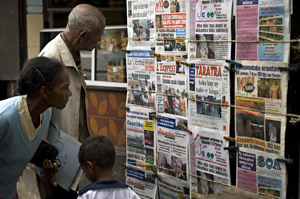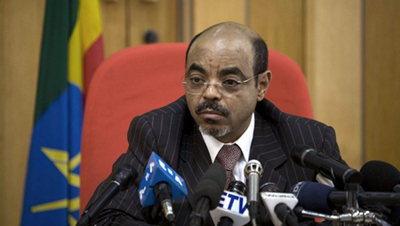
Niger president tightens grip on media with amendment
In Niger today, the government is holding a public referendum on a constitutional amendment that would pave the way for President Mamadou Tandja to run for office indefinitely. It would also further increase the former army colonel’s control over the press. Tandja, at left, has charged ahead with the referendum despite overwhelming public opposition after he…
For RFI, static in Kinshasa
Like many radio listeners in Kinshasa, the capital of the Democratic Republic of Congo, I tune to Radio France Internationale (RFI) on 93.4 FM or 105 FM. But beginning on July 24, the frequencies carried nothing but static. It was no accident. Media reports quoted government spokesman Lambert Mende as declaring a ban on RFI…

Only the Gambian president has press freedom
On July 22, Gambian President Yahya Jammeh once again went after journalists in an interview on the country’s only state-run television station. The president made a thinly veiled threat toward six independent journalists currently facing “seditious publication” and “criminal defamation” charges in the country: “So they think they can hide behind so-called press freedom and…

In Madagascar, media torn along partisan lines
“Are you sure about coming back here now?” My cousin in Antananarivo was a bit hesitant about the wisdom of my plan to visit the family while the political crisis was still weighing on the daily lives of Malagasy citizens. I had not been back to my home country in nine years until this summer.…
Walter Cronkite’s press freedom legacy
Walter Cronkite had such a profound impact in so many ways that one might overlook an important part of his legacy–his long efforts on behalf of international press freedom and his advocacy on behalf of local journalists around the world. Cronkite was a vital participant in the launch of the Committee to Protect Journalists 28…
In Namibia seal hunt, journalists said to become prey
July marks the start of seal hunting season in Namibia, where hunters will be allowed to kill more than 90,000 seals. British journalist Jim Wickens and South African cameraman Bart Smithers filmed the event near Cape Cross Colony on Thursday morning for a British advocacy organization, Ecostorm. That is, until the journalists became the hunted.
Global journalists rally behind Maziar Bahari
More than 100 prominent journalists from 47 countries sent a petition to the Iranian government today calling for the immediate release of Maziar Bahari, Newsweek’s Tehran correspondent, who has been held without charge in an Iranian jail since June 21. Compiled by CPJ, Index on Censorship, and Canadian Journalists for Free Expression, the petition was…

Press, politics at center of Eritrean mock trial
Articles published in Eritrea’s now-banned private newspapers are at the center of a mock political trial being filmed as an educational documentary this week at Sandra Day O’Connor College of Law at Arizona State University. Inside a courtroom on the sprawling Tempe, Ariz., campus, a judge of the High Court of Eritrea presides dispassionately, international observers lean into translation…
A year later, impunity in attacks on Senegalese media
A year ago last week in Senegal, two reporters covering a soccer match were assaulted with tasers, handcuffed, and abused by police officers after the reporters refused to halt a post-game interview at Léopold Sédar Senghor Stadium in the capital, Dakar. A year on, Senegalese law enforcement has fallen short in bringing to account those…

In Ethiopia, prime minister’s words, actions not in step
This week, in an exclusive interview with the Financial Times, Ethiopian Prime Minister Meles Zenawi suggested that the press in his country freely expresses dissent. In fact, that is hardly the case. The Horn of Africa nation remains one of the world’s worst backsliders of press freedom.